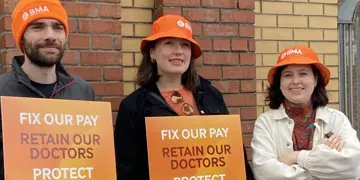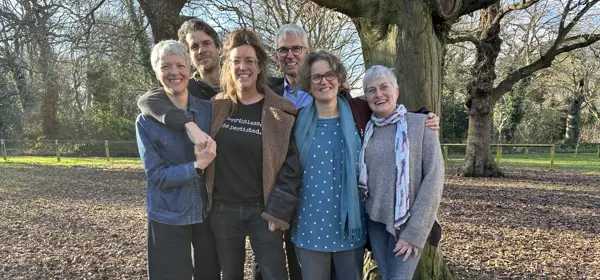Urgent action demand on pay in Northern Ireland
Urgent action demand on pay in Northern Ireland
Junior doctors will gather at Stormont today in a rally to mark the latest round of industrial action in Northern Ireland.
Hundreds of junior doctors are expected to take part in the event at the home of the Northern Ireland Assembly to call for urgent action to reverse years of real-terms pay decline.
The leader of BMA Northern Ireland junior doctors committee, Fiona Griffin, said it was ‘disappointing’ there had been no progress on pay negotiations, which could have stopped the latest strike. And she called on the new health minister Mike Nisbett to act now to resolve the dispute.
‘Today’s rally is about showing those in power that we need urgent action now on our pay asks if they are serious about saving and futureproofing the health service as we know it,’ said Dr Griffin. ‘We are extremely disappointed that this latest 48-hour walkout could not be averted but there has still not been any progress in our pay negotiations.
‘The health service cannot function without junior doctors and yet years of below inflation or non-existent pay awards – and the fact that we have still yet to be paid the minimum DDRB-recommended pay award for the last financial year – is a continual reminder to us that we are simply not valued for the complex and skilled work we undertake.’
Credible offer
Dr Griffin said morale had never been lower. ‘More of us are choosing to leave Northern Ireland to work elsewhere for better pay and conditions,’ she said.
‘The new health minister needs to seize the opportunity of solving this dispute once and for all by putting forward a credible offer that includes meaningful steps towards full pay restoration.
‘We do not want to have to call further strikes but we will be left with no choice but to do so if there is no movement on pay.’
The Northern Ireland Department of Health warned patients that there would be disruption to services as a result of the strike, which runs until 7am on Saturday 8 June. A spokesperson said a backdated pay award would be paid to junior doctors this month, in line with pay review body (DDRB) recommendations.
The BMA says that junior doctor pay in Northern Ireland has eroded by 30 per cent since 2008, and that junior doctors were undervalued, overworked and lacking in training opportunities.
Doctor considering move to Australia
A couple’s fears about their amount of debt they will have to live with
Oisín Fearon is considering his future – and chances are it won’t be in Northern Ireland. Having finished his foundation training, the Queen’s graduate is spending a year working as a locum – in part, because it has better pay and more flexibility than a training programme, but also because he needs the money.
‘Everyone at medical school accumulates debt,’ he says, adding grimly that he doesn’t dare look at the total outstanding. ‘It’s in the tens of thousands of pounds. So that comes out [of my salary] every month.’
His fiancée is in her second foundation year at the moment, and they are waiting until she finishes to decide their next move. ‘I can’t quite go to Australia yet and leave her here. But we’re getting married next year and we’re both going to locum and see how it goes. It will either be Australia or going into training here – I can’t say for definite, but I’m considering options abroad.’
Dr Fearon, who is 28, is earning more as a locum than he would in a training post and is trying to save up, both to get married and eventually to pay for a deposit on a house. He is aware that taking time out of training is potentially holding back his career – especially as he hopes to specialise in cardiology, which can be a long training programme.
There’s a lot of change in your life, a lot of sacrifice, and I was quite shocked at the wages
Dr Fearon
But as well as the increased pay packet from locuming, the flexibility it brings is also important to him. ‘I know people [in training posts] who have even found it difficult to get time off for their wedding day,’ he says. ‘I’d rather avoid that. And even if I’m not progressing in the world of medicine, if you like, I feel I’m progressing a bit in life.’
At the moment, he can’t see a realistic future for himself in Northern Ireland. ‘I don’t see myself working here long term, unless things change substantially,’ he says.
When he left school 10 years ago, and started medical school, he had no idea how much pay and conditions for doctors would worsen. ‘I would have had higher expectations for pay, and wouldn’t have realised how hard it would be to get time off,’ he says. ‘You have to fit your life around your job – it’s more all-encompassing than most other careers; it really takes over your life.
‘You have to make a lot of sacrifices – I used to play Gaelic football, but it was difficult to keep doing it, and you lose the social side as well. There’s a lot of change in your life, a lot of sacrifice, and I was quite shocked at the wages. The pay is crap, it really is. I remember realising on a Christmas shift or at New Year that I was easily the lowest paid in the hospital. It’s just not sustainable.’
- Until September 2024, resident doctors were referred to as ‘junior doctors’ by the BMA. Articles written prior to this date reflect the terminology then in use



